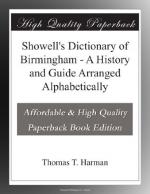questionable whether Gillott’s first efforts
at making steel pens did not spring from the knowledge
he gained from her as to what the Mitchells were doing
in that line. The Sheffield blade, however, was
the first to bring the “press” into the
proeess of making the pens, and that secret he must
have kept pretty closely from all but his lass, as
Mr. J. Gillott often told, in after life, how, on
the morning of his marriage, he began and finished
a gross of pens, and sold them for L7 4s. before they
went to church. The accumulation of his fortune
began from that day, the name of Gillott in a very
few years being known the wide world over. The
penmaker was a great patron of the artists, gathering
a famous collection which at his death realised L170,000.
His first interview with Turner was described in an
American journal a few years back. Gillott having
rudely pushed his way into the studio and turning the
pictures about without the artist deigning to notice
the intruder, tried to attract attention by asking
the prices of three paintings. Turner carelessly
answered “4,000 guineas,” “L3,000,”
and “1,500 guineas.” “I’ll
take the three,” said Gillott. Then Turner
rose, with “Who the devil are you to intrude
here against my orders? You must be a queer sort
of a beggar, I fancy.” “You’re
another queer beggar” was the reply. “I
am Gillott, the penmaker. My banker tells me you
are clever, and I have come to buy some pictures.”
“By George!” quoth Turner, “you are
a droll fellow, I must say.” “You’re
another,” said Gillott. “But do you
really want to purchase those pictures,” asked
Turner. “Yes, in course I do, or I would
not have climbed those blessed stairs this morning,”
was the answer. Turner marvelled at the man,
and explained that he had fixed the prices named under
the idea that he had only got an impertinent intruder
to deal with, that two of the pictures were already
sold, but that his visitor could have the first for
L1,000. “I’ll take it,” said
the prince of penmakers, “and you must make me
three or four more at your own price.”
If other artists did as well with Mr. Gillott they
could have had but little cause of complaint.
Another hobby of Mr. Gillott’s was collecting
fiddles, his specimens, of which he once said he had
a “boat load,” realising L4,000; while
his cabinet of precious stones was of immense value.
The millionaire died Jan. 5, 1872, leaving L3,000
to local charities.
Guest, James.—Originally a brass-founder, but imbued with the principles of Robert Owen, he became an active member of the Political Union and other “freedom-seeking” societies, and opened in Steelhouse Lane a shop for the sale of that kind of literature suited to ardent workers in the Radical cause. Mr. Guest believed that “all bad laws must be broken before they could be mended,” and for years he followed out that idea so far as the taxes on knowledge were concerned. He was the first to sell unstamped papers here and in the Black Country, and, notwithstanding heavy fines, and




